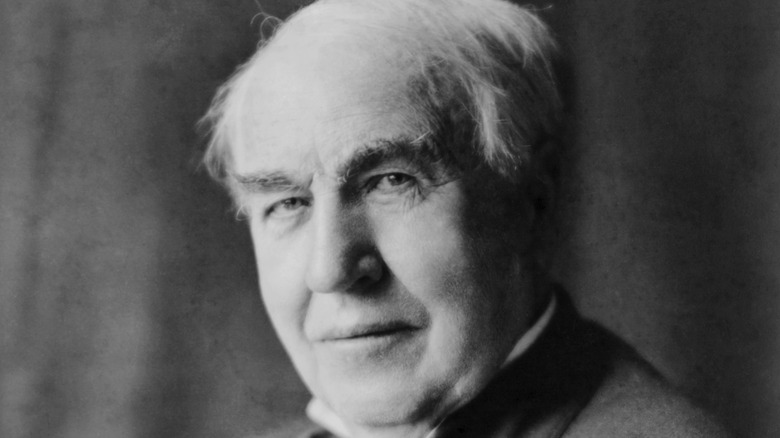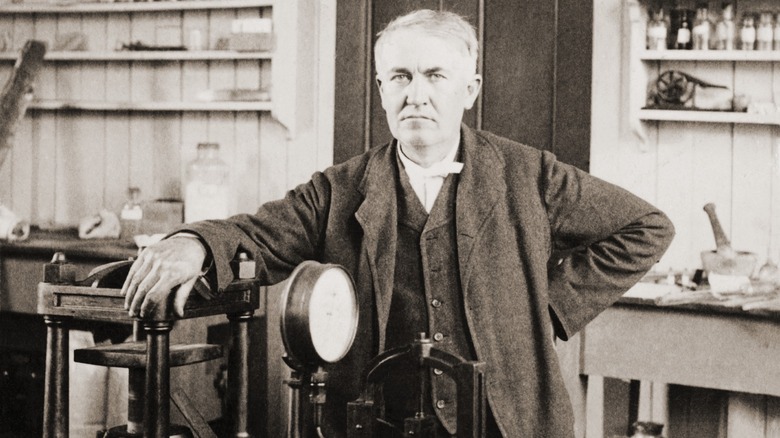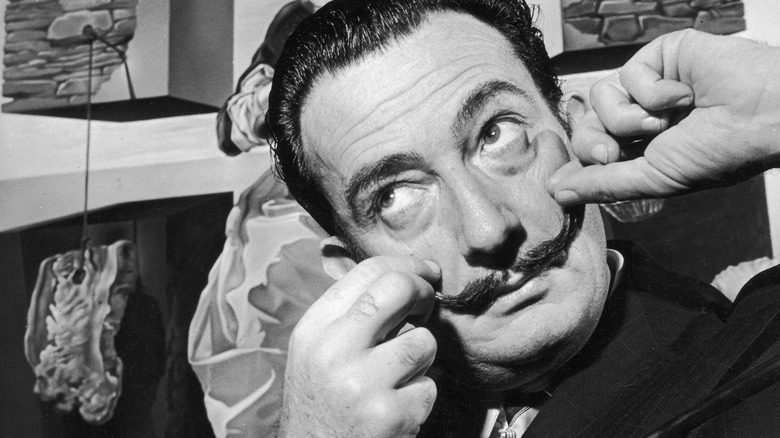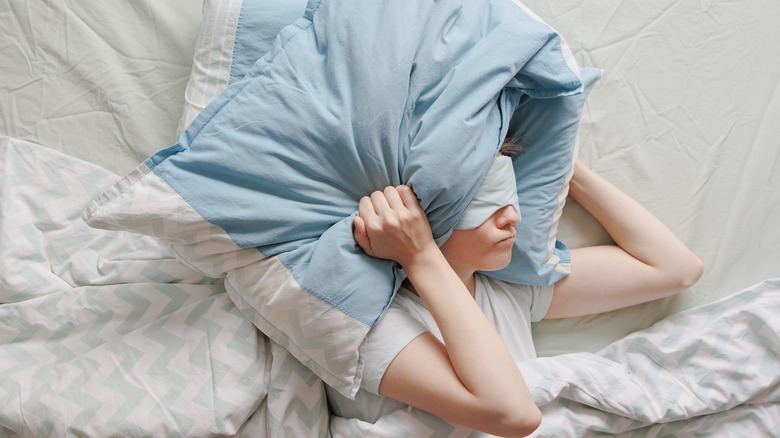Thomas Edison's Controversial Trick To Boost Creativity
Many people believe that a good night's sleep can help clear your head, making way for healthy thoughts and ideas. But one of the world's greatest minds believed that what sleep actually clears your head of are those ideas. Thomas Edison, aka the "Wizard of Menlo Park," was born in Ohio on February 11, 1847, and he lived to the ripe old age of 84 (via Britannica). He broke down the walls of scientific discovery with countless inventions — like the incandescent lamp, phonograph, and alkaline batteries — creating over 1,000 patents (via Inc.).
One might think that to be such a genius, being well-rested is a must — dedicated to a healthy sleep regimen to ensure the body and mind are working at peak performance. But Edison did anything but (which we do not recommend). In fact, he starved himself of sleep, and while you may imagine someone so sleep deprived would crave slumber, he detested it.
The Wizard of Sleep Deprivation
Thomas Edison prided himself on his ability to function on very little sleep and claimed to only get about four hours a night (via Scientific American). He looked down on those who got ample beauty rest because he hated it and believed it was a waste of time that could be better spent productively. However, as much as he might have wished that he could just never sleep, one of his biggest creativity boosters was powered by sleep (albeit bad sleep). Edison noticed that whenever he was about to fall asleep, he would have amazing ideas, and if he actually allowed himself to fall asleep, he would forget them. Many of us have this experience, but we usually just chalk it up to being a good old fever dream. You know, those ones where a giraffe-legged pigeon is stampeding through Paris wearing a party hat and singing "Happy Birthday"? Yeah, those ones.
But as weird as those thoughts we often forget (or want to forget) might be, we do some of our best thinking in that period of sleep called hypnagogia, where you're not quite asleep yet, but your muscles and mind relax just enough to have creative thoughts (via Science). Well, rather than just let those "brilliant" thoughts go down the drain of his well-rested mind, Edison found a way to shock himself awake to preserve the brilliance just long enough to remember.
Great Minds Think ... Tired
Thomas Edison was known to use a special method he (surprise, surprise) invented to boost creativity, where he would wake himself from the very first cycles of sleep when the creative mind is most active (via Scientific American). Holding a heavy ball in each hand, the inventor would fall asleep, and once deeply relaxed, he would drop the balls onto the floor, which produced a loud noise. The noise would scare him awake during these creative periods of being half-asleep, and he would remember the semi-lucid thoughts most sleepers forget.
Other great minds, such as Albert Einstein and Salvador Dali, followed in his odd sleep-depriving behavior (via Inc.). Using a large, heavy key instead of balls (via Science), Dali swore by Edison's method, and seeing as most of his paintings are dream-based — like "Dream Caused by the Flight of a Bee Around a Pomegranate" and "Disintegration of the Persistence of Memory" — this should come as no surprise (via Salvador Dali Prints).
Studies Supporting the Method
Researcher Delphine Oudiette and her colleagues conducted a study at Paris Brain Institute, making some believe Thomas Edison's theory that the creative window just before sleep can be harnessed (via Scientific American). The state — called hypnagogia, as we mentioned before (via Science) or N1 for non-rapid-eye-movement sleep stage 1 — seems as if it can be interrupted in order to recall the thoughts produced during it.
In the study of 103 people, participants were asked to take a math test, and those who could pass before the study commenced were disqualified. Those who did not pass were asked to rest while reclined, holding a glass in their right hand. If they dropped the glass, they were then interviewed about anything they remembered thinking about before it fell. All the participants were monitored for their brain, eye, and muscle activity to determine if they were in the N1 sleep cycle. Once their break was through, they were asked to complete the same math test from the beginning, and those who had fallen asleep only to be woken up by the glass were three times more likely to solve it (albeit after a few attempts). They were also six times more likely to solve it than those who had fallen completely asleep.
Skeptics and Studies Against It
Another entirely separate and uninvolved study across the country, though, may have proven the opposite (via Each Night). At the University of California, researchers performed Remote Associates Tests (RATs) on participants in three separate groups: one that was allowed to rest but not sleep, another that was allowed to reach non-REM sleep, and another that was allowed to sleep deeply. All of those who were allowed to sleep fully saw improved creative thinking, and 40% of the well-rested actually performed better on a creativity test than those who either didn't sleep at all, or didn't get good, deep REM sleep.
Some skeptics of Delphine Oudiette's study believe that her participants who dropped their drinking glasses only performed better because they got a bit of rest (via Scientific American). Skeptics of Thomas Edison's theory, in general, however, believe it could be truly dangerous. While there could be some merit to harnessing the creative processes that occur when half-asleep, the real question is if we should.
The Dangers of Sleep Deprivation
Up to 19% of American adults report not getting enough sleep, while 40% report falling asleep during the day because they are so sleep-deprived at least once a month (via Single Care). Even more serious, up to 70 million have chronic sleep disorders, which can lead to serious long-term side effects like memory loss (via Sleep Foundation).
Whenever we fall asleep, our brain repairs itself and creates new pathways for information to be fully digested, which impacts cognitive function. So without it, our mind quite literally deteriorates — we have trouble regulating our emotions, making decisions, and solving simple problems. Sleep deprivation was even proven to cause brain damage in rats (via The Atlantic). And if that's not scary enough, try heart problems, stroke, obesity, anxiety and depression, immune system deficiency, diabetes, and more (via Sleep Health Solutions). So while some of the greatest minds have done some of their greatest thinking using this method, maybe it's not the greatest idea.





